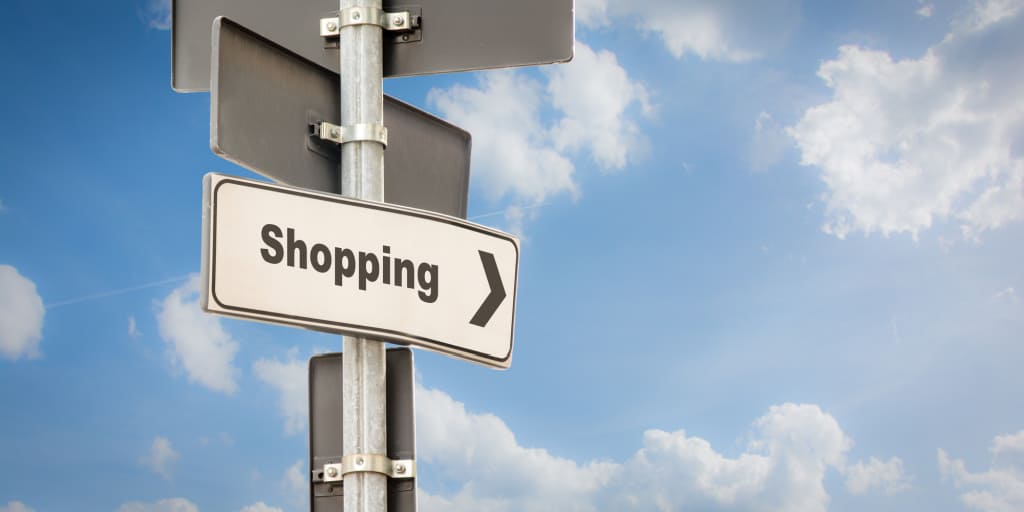Do You Have a Shopping Addiction? [How to recover]
(This page may contain affiliate links and we may earn fees from qualifying purchases at no additional cost to you. See our Disclosure for more info.)
Shopping is very much a part of everyday life, especially in today’s world of one-click purchases and Apple Pay.
But when shopping becomes a compulsion, you buy things you don’t need, or you’re deeply in debt because of your purchases, there may be a bigger problem at hand.
A shopping addiction, commonly known as Compulsive Buying Disorder (CBD) or Buying-Shopping Disorder (BSD), is defined as an obsession or compulsion to make purchases to soothe feelings of stress or anxiety to your financial detriment.
The National Institutes of Health notes that shopping addictions tend to run in families. And compulsive shoppers often have other disorders or addictions present.
But like some other behavioral addictions, the American Psychiatric Association (APA) doesn’t recognize Shopping Addiction as its own separate disorder.
This can make it hard to identify the condition in yourself or a loved one. Or to find resources to help you treat the addiction.
However, research shows shopping addictions are so prevalent that they affect up to 6% of the US population. The vast majority of those they affect (80-95%) are women.
How Do I Know I Have a Problem?
While anyone can buy too much at one time or another, give in to the occasional impulse purchase, or bust a holiday budget during a shopping spree, there are a few critical signs of compulsive buying behavior or an addiction to shopping.

According to Psych Guides, if you or a loved one is lying about your shopping, that’s a very good indication there’s a problem.
For example, you might say you went shopping but lie about how much you spent, and hide some of your shopping bags or purchases.
Human beings are very good at justifying our own behavior to ourselves. So it’s easy to say, “I’m just fibbing about this one purchase,” or “He won’t understand why I bought this.”
But lying is a sign that you’re trying to hide your behavior, which probably indicates one or more people in your life think something is wrong.
The Emotions
People often develop shopping compulsions or addictions for emotional reasons.
If you find yourself swiping your credit or debit card to make yourself feel better, or buying items because you’re feeling guilty about a past purchase or event, then you may have a shopping addiction.
Buying things can give you hits of dopamine that light up the reward center in your brain. This gives you a temporary respite from feeling anxious or depressed.
Over time, you may come to rely on these hits to get you through negative emotions.
Yet buying stuff only provides temporary relief. And compulsive shoppers have to keep making purchases to relieve their negative emotions.
Another indicator that you might have a shopping addiction is if you suffer from another mental health issue or mood disorder.
This could be depression, anxiety, obsessive-compulsive disorder, drug or alcohol abuse, or anorexia or bulimia.
Impulse Control
While the reasons for shopping addiction aren’t always clear, studies have shown it can often be categorized as an impulse-control disorder, like gambling.
Lots of people with compulsive buying disorders also struggle with other conditions or addictions.
Do you primarily buy things online?
Some people with shopping addictions avoid shopping in person because they’re embarrassed by how much they’re buying.
Other reasons for buying primarily online are the ability to easily purchase from multiple stores and shop any time of the day without having to wait for stores to open.
While excessive online shopping habits or buying compulsions may not leave you with physical scars, they can ruin you financially.
If you regularly spend money, you know you don’t have to make non-essential purchases like clothes, shoes, or jewelry, you may have an addiction to shopping.
Financial problems like a large amount of credit card debt, bankruptcies, or only being able to pay the minimum on your credit cards due to uncontrolled shopping trips are red flags you have a bigger problem.
Take the Test
Debtors Anonymous lists fifteen questions to help you determine if you have a problem with debt. Because a shopping addiction so often leads to financial distress, you can also use this test to measure a shopping addiction.
- Are your debts (or your shopping) making your home life unhappy?
- Does the pressure of your debts distract you from your daily work?
- Are your debts (or your shopping) affecting your reputation?
- Do your debts (or the amount you buy) cause you to think less of yourself?
- Have you ever given false information in order to obtain credit?
- Have you ever made unrealistic promises to your creditors?
- Does the pressure of your debts make you careless of the welfare of your family?
- Do you ever fear your employer, family, or friends will learn the extent of your total indebtedness (or the extent of your purchases)?
- When faced with a difficult financial situation, does the prospect of borrowing give you an inordinate feeling of relief?
- Does the pressure of your debts cause you to have difficulty sleeping?
- Has the pressure of your debts ever caused you to consider getting drunk?
- Have you ever borrowed money without giving adequate consideration to the rate of interest you are required to pay?
- Do you usually expect a negative response when you are subject to a credit investigation?
- Have you ever developed a strict regimen for paying off your debts (or quitting shopping), only to break it under pressure?
- Do you justify your debts (or the amount you purchase) by telling yourself that you are superior to the “other” people, and when you get your “break,” you’ll be out of debt overnight?
You probably have a buying compulsion or addiction if you answered “yes” to eight or more questions above.
Why Do I Have a Shopping Addiction?
There are many theories about why shopping addictions develop.
If you experienced childhood trauma or abuse or have a history of shopping addiction in your family, you’re more likely to have a problem with addictive shopping behaviors.
If you grew up in a home environment where your parents spent above their means, you never practiced delayed gratification, or your family felt it necessary to show off with designer labels, that may affect your current shopping habits.
Adverse Effects of a Shopping Addiction
While “retail therapy” may temporarily provide a rush of excitement, being addicted to shopping can hurt more than just your credit.

Shopping addictions can harm or destroy your marriage/partnership, ruin your trust with loved ones, or even cause you to lose your home. If you’re regularly lying about your shopping or your debt, you will affect your relationships and reputation.
A shopping addiction can also ruin your self-esteem and take away your trust in yourself.
If you’re using shopping to control negative emotions like anxiety or depression, you may instead make those feelings worse as you become dependent on the temporary dopamine hits your purchases bring you.
Overcoming Compulsive Shopping Behaviors
Besides cutting up your credit cards, using only cash, avoiding online stores, and always using a needs-only shopping list when heading out to shop, overcoming an online shopping addiction or compulsive spending habit will require you to do some deep work.
Start by uncovering your money story and determining your core values.
Then you'll want to track all your spending, create a sensible budget, avoid taking on more debt, and develop a debt pay-off strategy.
You might need to find a new route to work to avoid passing your favorite store. Or develop a new healthy habit to fill the emotional void a shopping spree used to fill.
And you'll likely want to enlist the help of family or friends to assist you through periods and events when impulse buying or a shopping spree would typically help you cope.
You may even want to meet with a mental health professional.
Read Melissa's story about her out-of-control shopping behavior and how she recovered.
Help is Available
Many treatments and support are available for people with a problematic shopping addiction or compulsive behavior for spending.
These including online therapy, inpatient treatment centers, 12-step programs, and support groups like shopaholics anonymous.
It can be challenging to treat a spending addiction since much of modern life involves shopping online and instant purchases.
In extreme cases, those who engage in compulsive shopping relinquish control of their finances to a trusted friend or family member to regain control of their spending and stop the spiral of debt.
Cognitive Behavioral Therapy
Cognitive Behavioral Therapy, or CBT, is one of the most successful behavioral treatments for a host of disorders, including Shopping Addiction.
CBT centers around retraining your brain and relearning how to talk to yourself when tempted to make a purchase. It also helps you learn how to identify and avoid triggers that cause you to overspend.
Debtors Anonymous
Debtors Anonymous is a 12-step program that helps compulsive shoppers learn to manage their spending.
The organization hosts meetings in over fifteen countries. It provides support and resources for individuals with shopping addictions or other debt problems. Visit their website to find a support meeting near you.
Medication
Recovering shopping addicts often work with a therapist or psychiatrist because many addicts have found help managing their symptoms with pharmaceuticals such as SSRIs (selective serotonin reuptake inhibitors) like Prozac or Lexapro.
If you’re using shopping to improve feelings of depression or anxiety, your therapist can help you better manage those feelings through therapy or an anti-anxiety or depression medication.
Closing Thoughts
While a shopping addiction can wreak havoc on your money and relationships, many shopping addicts have successfully gone through treatment to help.
They've learned how to retrain their brains and manage their addictive habits, compulsive behavior, or impulse control issues.
You can get help for your shopping addiction, and you can get better. You’re not alone: there are many organizations, therapists, and individuals who can and will help you.
Bonus tip: Check to see if you have a confidential Employee Assistance Program (EAP) at your place of employment that could put you in touch with a therapist or support organization.
Related: Items to Stop Buying to Save Money and Curb Clutter

Article written by Laurie
Laurie is a team member of Women Who Money and the founder of The Three Year Experiment, a blog about building wealth in order to become location independent.
